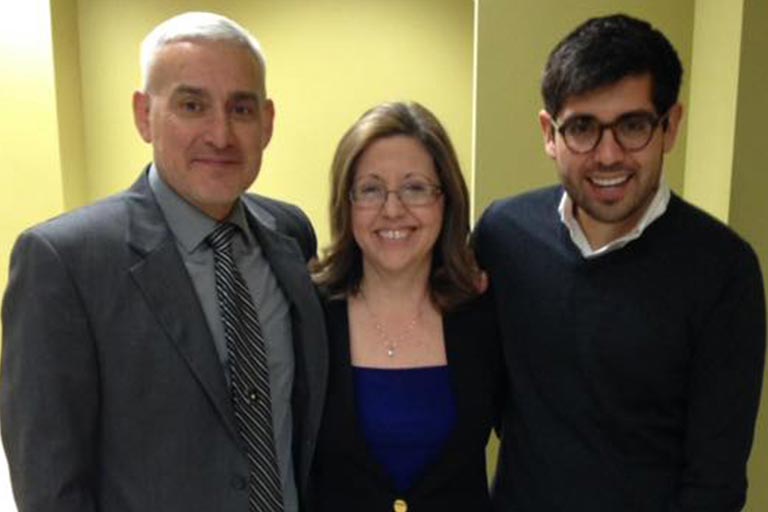Dr. Beatriz Pacheco, who received a 1989 B.A. in English and a 2009 M.A. in English from Eastern New Mexico University, recently received the Dr. Mary Angela Schaunessey Leadership Education Award from Spalding University for outstanding scholarship in the field of education. This honor was the result of her work in the field of reading education as detailed in her study "The Impact of iPad Multimodalities on the Literacy Skills of Adolescent Males Identified as Low-Achieving Readers."
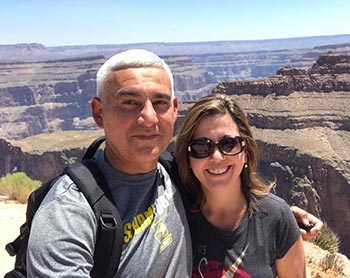
It is one of the few studies conducted that looks at longitudinal data to see if screen reading is impacting comprehension in a positive or negative way for struggling readers.
Dr. Pacheco says that she was first inspired to pursue her degrees, which also include a Doctorate in Educational Leadership from Spalding University in Louisville, Kentucky, by ENMU professors.
"Dr. Paul Coggins was an English professor at ENMU who initially convinced me to change my major to English," said Dr. Pacheco. "He also got to me to really love British literature. He truly changed the course of my life.
"Dr. Ollie Oviedo also inspired me and gave me the opportunity to do things that I would otherwise not have had the opportunity to do. Dr. Charles Gurwell was my Spanish professor and contributed so much to my growth. He was also so kind and generous. My experience at ENMU was both nurturing and positive.
"And, of course, my favorite professor was Dr. Patrice Caldwell. She was such an inspiration as a female with a doctorate and demonstrated such passion, knowledge and skill in the classroom. She made me want to be just like her."
Dr. Pacheco says that Monica Herrera, a recruiter for ENMU in the 80's, started the Hermanito's program to connect first-generation Hispanic students with other first-generation Hispanic students who were already established in college and finding success. Dr. Pacheco was invited to be a mentor to other Hispanic students and found this a very rewarding opportunity.
"Ms. Herrera's vision was ahead of her time. She truly cared about not only increasing the diversity at the college but was also invested in making certain that once a student arrived on campus, he or she was given all of the support necessary to find success," Dr. Pacheco said.
She married her husband, Gilbert, in her senior year of college and he was soon assigned to a long-range surveillance unit that patrolled the border between East and West Germany. Dr. Pacheco's first job after graduating was in Darmstadt, West Germany, as a registrar for both City Colleges of Chicago and Central Texas College. Within three months she was promoted to regional registrar for CTC with 21 sites to oversee.
After working with the college for several months in this capacity, she was approached about teaching English courses for CTC in the evenings. Since then, she has taught in public, private and Department of Defense Schools in New Mexico, Texas, Oklahoma, Kentucky, North Carolina, Germany and South Korea.
Dr. Pacheco currently works as a Learning Differences Coordinator at Saint Xavier High School in Louisville, Kentucky. Saint Xavier is an all-male college-preparatory high school with a population of over 1,300 students. She is involved in creating Accommodation Plans for students with disabilities such as ADHD, dyslexia, autism and dysgraphia.
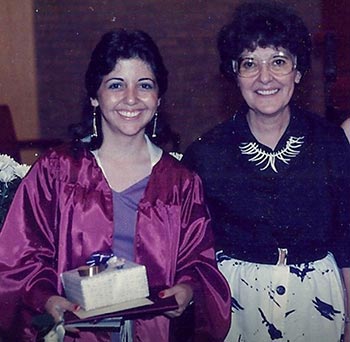
She also works with the College Board and ACT to get accommodations for standardized tests for this group. She teaches a reading class for students who are significantly below grade level in reading and oversees the school's EXCEL program for students who have various learning challenges. She trains and oversees teachers in this capacity and works directly with parents, counselors and administrators to develop programs to suit the needs of these students.
It was in working with this group that Dr. Pacheco was able to gather five years of longitudinal data regarding outcomes for struggling readers who were exposed to specific Response to Intervention strategies, to include the use of the iPad for literacy instruction. This information resulted in the study that culminated in Dr. Pacheco's award for educational leadership from Spalding University.
Dr. Pacheco also recently wrote a book detailing the history of education and how technology is changing the way that people think and learn. The book, "The Rise of the Human Digital Brain: How Multidirectional Thinking is Changing the Way We Learn," is currently with the publisher undergoing final edits and should be released by June 2018.
Dr. Michael Gurian, best-selling New York Times author of "The Wonder of Boys" and "The Minds of Girls" and head of the Gurian Institute, said of the book:
"Beatriz Pacheco's experience as both a researcher and a practitioner in the field of education lends an authenticity to her writing that is both refreshing and enlightening. She has conducted one of the most comprehensive studies to date concerning the use of the iPad for direct instruction, and the results of her study have the potential to influence the teaching of literacy skills on the national level. I highly recommend this book."
Dr. Pacheco, who says she would love to one day work as a representative for underserved populations on a more national level, graduated from Tucumcari High School where she was first chair clarinet in the band, historian of the Honor Society, president of Students Active in Education and secretary of the Science Club.
"I have obviously been a nerd for my entire life," she said. "I did marry the high school all-state football running back, however. He was way cooler than I was!"
Dr. Pacheco and her husband lived in Germany when the Berlin Wall fell.
"I remember seeing the small, compact cars coming across into West Germany from the East. They were packed with everything a family could carry with them. It was a very surreal experience," she said.
"When we lived in South Korea, my husband took my son and me to the DMZ. Seeing the bunkers where soldiers sit and wait in the event of an attack really made the potential of war more real to me. It was also an opportunity to share with my son another culture. He really grew from being exposed to the beauty of Korea as well as the history.
"We always traveled and explored on weekends to learn more about the places we lived, and this resulted in my son developing a love of travel as well as a deep empathy and understanding for others.
"We have traveled extensively, and I guess what I can say about all of these experiences is that people are pretty much the same everywhere. We all want happiness. We all experience joy and we all experience sorrow.
"I recall a group of Japanese tourists stopping to ask for a picture with my then six-month-old son in front of Neuschwanstein Castle in Germany. They were surrounded by beautiful and impressive scenery of the place we were visiting, yet they wanted a picture with a smiling baby. That is the human aspect of travel. The opportunity to meet so many people and realize that our similarities unite us far more than our differences separate us."
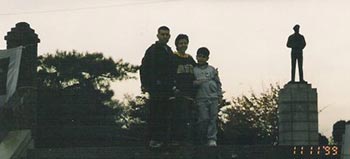
Dr. Pacheco says her happiest moments are with her family. When their son Diego graduated with a B.S. in business from Saint Louis University, it was a high point for Gilbert and her. When Diego was accepted to the University of Virginia to pursue his MBA and received a scholarship, "It was a very exhilarating experience for all of us. My son works very hard, and I cannot take credit for his success, but I certainly enjoy seeing him make the most of this life and the opportunities that he has been given."
She says when she married her husband and moved to Germany, "It was the start of a wonderful new life for me, and I could never have imagined how far we would go together. We will be married 30 years in October, and I can honestly say that he changed my life for the better. We have had many, many wonderful experiences together and I would not trade any of it for the world."
Dr. Pacheco's saddest moment is the death of her mother, Betty Gonzales, in 2012.
"She used to drive me by Eastern New Mexico University when I was a child. She always said, 'One day you will go to school there.' It was never an 'if' with her. It was always 'when.'
"My mother was ahead of her time, and she worked when most mothers stayed home. She truly desired an education herself, but, sadly, she was told that females didn't need to go to college. I remember her saying that because my sister and I were girls, we needed an education more, not less. I was truly sad that she did not live to see me get my doctorate, but she never doubted for one second that I one day would achieve it.
"That is the kind of love that pushes you forward and carries you for the rest of your life. She may no longer be with me, but her influence is still felt in every aspect of my life."
Born in Albuquerque, Dr. Pacheco moved to Tucumcari when she was 8. Her father, Rudy, had a ranch in Roy, New Mexico, and her mother, Betty, worked for Soil Conservation Service as a secretary. Her father also owned a business (Signs by Rudy) and painted signs up and down the I-40 corridor. Her older sister, Maria, was the first in their family to get a four-year degree and a master's degree. They were roommates in college.
The Pacheco's son, Diego, is now 27. He is working on his MBA at the Darden School of Business at the University of Virginia. Diego attended some summer courses at ENMU in 2009 between his freshman and sophomore years at Saint Louis University and was "very impressed with the quality of education that ENMU provided."
One of his professors was from Louisville where the Pachecos reside and "they developed a strong rapport."
Dr. Pacheco and her husband graduated from Tucumcari High School in 1985. He joined the military in 1986 and served with the 82nd Airborne Division at Fort Bragg, North Carolina. He then worked with the 165th Military Intelligence in Germany and eventually became a first sergeant for the Lawton Recruiting Company in Lawton, Oklahoma.
He also worked with Special Forces Recruiting in North Carolina and South Korea. He eventually went to work as an inspector with the Office of the Inspector General, Recruiting Command at Fort Knox, Kentucky. He retired after 22 years of active-duty service and currently works as a civilian with the Office of the Inspector General on Fort Knox.
Dr. Pacheco hopes that the study that she conducted regarding literacy for low-performing readers, detailed in her book, will add to the conversation and help educators around the country develop new literacy programs designed to leverage the skills of the 21st Century Learner.
"Literacy is the key to everything, and it needs to be a national priority," she said.
She also wants to work with Hispanic populations to help increase college readiness, accessibility and completion rates.
"I think of my beautiful mother being denied access to an education because she was poor, Hispanic and female," Dr. Pacheco said. "She was smart and should have been given access to the education that she deserved. I also think of my father who tried to go to college only to have his dreams interrupted by the draft. He did not understand the systems in place and how they were working against him. If he had been educated to better understand how the system worked, he could have completed his education as well."
Dr. Pacheco says when you feel like giving up on a goal, it is important to remember why you started trying in the first place.
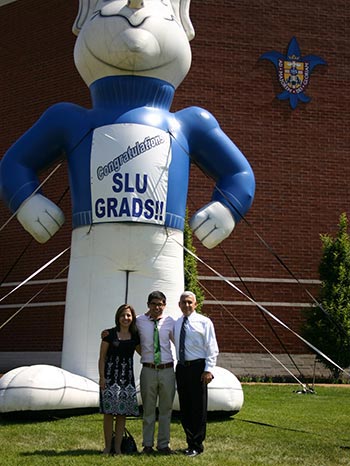
"My husband has accomplished quite a lot over the course of his life. He was one of 11 children and grew up in extreme poverty," Dr. Pacheco said. "He never gave up. He helped me to really see that child sitting in front of me who may be hungry or may not have a proper coat to keep warm and why reading 'Romeo and Juliet' might not be a priority that day. He always asked me, no matter how little we may have had ourselves, to let him know if a child needed anything that we could provide. He helped me to understand that the reason that we do things in life should not be for self-gratification. We should do things so that we can leave this world a better place than we found it."
Dr. Pacheco says she started to work on her doctorate because she had a student who would meet with her every day after school for extra tutoring.
"He desperately wanted to do well, and every trick in my book wasn't enough to help him," she said. "I knew at that point that I needed a better understanding of the neurological underpinnings of the learning process."
While working full-time, she worked for five years on her doctorate, taking classes on Wednesday evenings, weekends and during the summer.
"I wanted to quit at many points along the way, but my husband encouraged me to keep moving forward," she said. "My son is also a tremendous inspiration to me. He never quits when he sets a goal. I have been blessed with so many inspirational people in my life."
Dr. Pacheco says that the education that she received at ENMU changed her life.
"For years, I only had a B.A. degree, but that one degree propelled me into positions that would otherwise have been closed to me. I am eternally grateful to ENMU for the gift of an education that allowed me to move forward and obtain a doctorate," she said.
"I am also grateful that this simple gift of an education has also changed my son's life as I was better prepared to help him reach his goals in life.
"There is a quote that says 'The true meaning of life is to plant a tree under whose shade you may never sit.' All of the educators and individuals who impacted me at ENMU did just that.
"Eastern forever impacted the trajectory of my life, and it will impact my family for generations to come."



